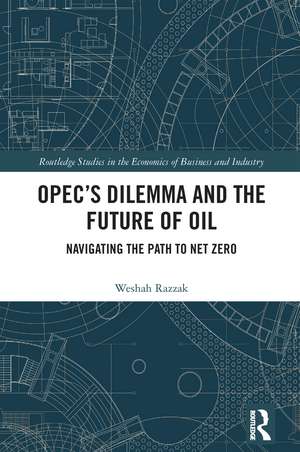OPEC’s Dilemma and the Future of Oil: Navigating the Path to Net Zero: Routledge Studies in the Economics of Business and Industry
Autor Weshah Razzaken Limba Engleză Hardback – aug 2024
Din seria Routledge Studies in the Economics of Business and Industry
- 9%
 Preț: 868.23 lei
Preț: 868.23 lei -
 Preț: 153.11 lei
Preț: 153.11 lei -
 Preț: 312.86 lei
Preț: 312.86 lei -
 Preț: 326.14 lei
Preț: 326.14 lei - 9%
 Preț: 934.96 lei
Preț: 934.96 lei -
 Preț: 319.31 lei
Preț: 319.31 lei -
 Preț: 310.12 lei
Preț: 310.12 lei -
 Preț: 385.47 lei
Preț: 385.47 lei -
 Preț: 381.00 lei
Preț: 381.00 lei -
 Preț: 381.43 lei
Preț: 381.43 lei - 21%
 Preț: 256.48 lei
Preț: 256.48 lei -
 Preț: 357.98 lei
Preț: 357.98 lei -
 Preț: 366.08 lei
Preț: 366.08 lei -
 Preț: 185.56 lei
Preț: 185.56 lei -
 Preț: 397.16 lei
Preț: 397.16 lei -
 Preț: 380.63 lei
Preț: 380.63 lei - 9%
 Preț: 1006.49 lei
Preț: 1006.49 lei - 18%
 Preț: 1001.39 lei
Preț: 1001.39 lei - 18%
 Preț: 1058.69 lei
Preț: 1058.69 lei
Preț: 944.74 lei
Preț vechi: 1152.11 lei
-18% Nou
Puncte Express: 1417
Preț estimativ în valută:
180.80€ • 188.06$ • 149.26£
180.80€ • 188.06$ • 149.26£
Carte tipărită la comandă
Livrare economică 15-29 aprilie
Preluare comenzi: 021 569.72.76
Specificații
ISBN-13: 9781032784854
ISBN-10: 1032784857
Pagini: 172
Ilustrații: 198
Dimensiuni: 156 x 234 mm
Greutate: 0.42 kg
Ediția:1
Editura: Taylor & Francis
Colecția Routledge
Seria Routledge Studies in the Economics of Business and Industry
Locul publicării:Oxford, United Kingdom
ISBN-10: 1032784857
Pagini: 172
Ilustrații: 198
Dimensiuni: 156 x 234 mm
Greutate: 0.42 kg
Ediția:1
Editura: Taylor & Francis
Colecția Routledge
Seria Routledge Studies in the Economics of Business and Industry
Locul publicării:Oxford, United Kingdom
Public țintă
PostgraduateCuprins
Chapter 1. The Dilemma, the Stylized Facts, and the Objectives Chapter 2. The Stress Test Strategy Chapter 3. The Time Series Properties of OPEC Data Chapter 4. Estimating Baseline Permanent Income for OPEC Chapter 5. Counterfactual Design and Empirical Stress Tests Chapter 6. OPEC’s Options are Limited and Challenging
Notă biografică
Weshah Razzak is Honorary Research Fellow at the School of Economics and Finance, Massey University, Palmerston North, New Zealand.
Descriere
This book is a new stress test in applied econometric analysis of oil producing countries. It includes positive economic analysis using a sample of 11 OPEC countries from 1970 to 2019; and presents an empirical analysis of OPEC’s operating model – the state-owned oil monopoly, hence its dilemma.
